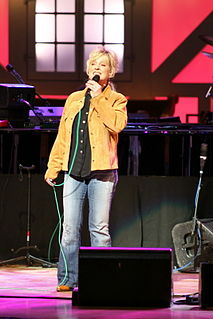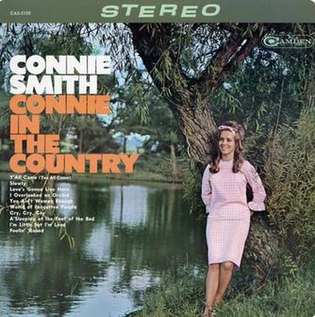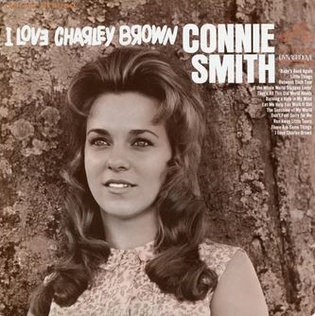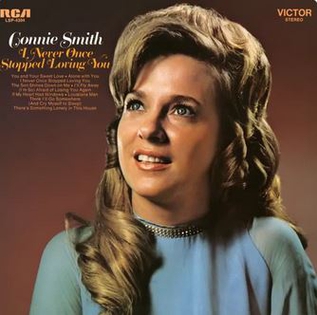Related Research Articles

Connie Smith is an American country music singer. Her contralto vocals have been described by music writers as significant and influential to the women of country music. A similarity has been noted between her vocal style and the stylings of country vocalist Patsy Cline. Other performers have cited Smith as influence on their own singing styles, which has been reflected in quotes and interviews over the years.

In the Good Old Days is the third solo studio album by American singer-songwriter Dolly Parton. It was released on February 3, 1969, by RCA Victor. The album was produced by Bob Ferguson. It peaked at number 15 on the Billboard Hot Country LP's chart. The album's title track was the only single released and it peaked at number 25 on the Billboard Hot Country Singles chart.

"Once a Day" is a song written by Bill Anderson and recorded as the debut single by American country artist Connie Smith. It was produced by Bob Ferguson for her self-titled debut album. The song was released in August 1964, topping the Billboard country music chart for eight weeks between late 1964 and early 1965. It was the first debut single by a female artist to reach number one on the Billboard Hot Country Songs. This song peaked at number one for the week of November 28, 1964, and it stayed at number one for eight consecutive weeks, a record for a female solo artist for nearly 50 years, until it was surpassed by Taylor Swift's "We Are Never Ever Getting Back Together" in December 2012.

Cute 'n' Country is the second studio album by American country music artist Connie Smith. The album was released in October 1965 on RCA Victor Records and was produced by Bob Ferguson. The album featured the major hit single from the year, "I Can't Remember". The album itself peaked within the top 10 on the Top Country Albums chart upon its release in 1965.
"I Can't Remember" is a song written by Bill and Bette Anderson, and recorded as a single by American country artist, Connie Smith. It was produced by Bob Ferguson and was released on her 1965 album, Cute 'n' Country. The song was released in April 1965, reaching the Top 5 on the Billboard country music chart, becoming her third Top 10 hit. It was Smith's third single released under the RCA Victor label.

Connie Smith is the debut studio album by American country music artist Connie Smith. It was released in March 1965 on RCA Victor Records and was produced by Bob Ferguson. The album included Smith's debut single, "Once a Day". The song became her signature recording and biggest hit, reaching number one on the Billboard country songs chart.

Miss Smith Goes to Nashville is the third studio by American country artist, Connie Smith. The album was released March 1966 on RCA Victor Records and was produced by Bob Ferguson. The album included two of Smith's singles released between 1965 and 1966: "If I Talk to Him" and "Nobody But a Fool ."

Born to Sing is the fifth studio album by American country music artist, Connie Smith. The album was released September 1966 on RCA Victor Records and was produced by Bob Ferguson. It became her third album to peak at #1 on the Billboard Top Country Albums chart, as well her final album to do so.

Connie Smith Sings Great Sacred Songs is the fourth studio album by American country music artist, Connie Smith. The album was released in June 1966 on RCA Victor Records and was produced by Bob Ferguson. This album was Connie Smith's first gospel recording and would set the trend for a series of gospel releases she would issue in the next decade.

Downtown Country is the sixth studio album by American country artist, Connie Smith. The album was released in January 1967 on RCA Victor Records and was produced by Bob Ferguson. The album featured Smith's major hit singles from 1966, "The Hurtin's All Over," which peaked within the Top 5 on the Billboard Magazine Country chart.

Connie in the Country is the seventh studio album recorded by American country artist, Connie Smith. The recording was released in February 1967 as a budget album on RCA Camden Records and was produced by Bob Ferguson.

Connie Smith Sings Bill Anderson is the eighth studio album by American country artist, Connie Smith. The album was released in June 1967 on RCA Victor Records and was produced by Bob Ferguson. The album included Smith's 1967 single, "Cincinnati, Ohio," which became a Top 5 hit on Billboard Magazine's country chart.

The Best of Connie Smith is the first compilation album released by American country artist, Connie Smith. The album was released in September 1967 on RCA Victor Records and was produced by Bob Ferguson. The album compiled Smith's major hits between 1964 and 1966, including one new single.

I Love Charley Brown is the tenth studio album by American country music artist, Connie Smith. The album was released in April 1968 and was produced by Bob Ferguson. The album contained three Top 10 hit singles Smith had between 1967 and 1968.

Connie's Country is the twelfth studio album by American country music artist, Connie Smith. The album was released in April 1969 by RCA Records and was produced by Bob Ferguson. It was Smith's first album release in 1969 and contained the single, "Ribbon of Darkness," which became a major hit.

I Never Once Stopped Loving You is the fourteenth studio album by American country music artist, Connie Smith. The album was released in September 1970 by RCA Records and was produced by Bob Ferguson and Ronny Light. The album spawned two singles, the title track, which became a Top 10 hit, and "Louisiana Man."

New Horizons is the thirty first studio album by American country music artist, Connie Smith. The album was released in March 1978 on Monument Records and was produced by Ray Baker. It was Smith's final studio album released under Monument and contained four singles released between 1977 and 1978, including "I Just Want to Be Your Everything."
"Then and Only Then" is a song written by Bill Anderson and recorded by the American country artist, Connie Smith, on her Connie Smith. It was produced by Bob Ferguson and released in January 1965, reaching the Top 5 on the Billboard country music chart in early 1965, becoming her second major hit. It was her follow-up single to her multi-week number one hit, "Once a Day", which was released the previous year.

The albums discography of Connie Smith, an American country artist, consists of thirty four studio albums, one live album, thirteen compilation albums, two box sets, and fifteen other appearances. After the success of her 1964 single "Once a Day", Smith's self-titled debut album was released in March 1965 on RCA Victor Records. The album reached number one on the Billboard Top Country Albums, spending thirty weeks on the chart, while also becoming her only album to reach the Billboard 200 list (#105). Smith's next two secular albums, Cute 'n' Country and Miss Smith Goes to Nashville went to number one and number two respectively between 1965 and 1966. In September 1966 Smith released her fifth studio album, Born to Sing, which was her third album to reach the top spot on the Billboard country albums chart. Due to Smith's popularity, RCA Victor issued five albums between 1967 and 1968 including Downtown Country (1967), Connie Smith Sings Bill Anderson (1967), and I Love Charley Brown (1968). In 1969, Smith collaborated with country artist Nat Stuckey on the album Young Love.

The singles discography of Connie Smith, an American country artist, consists of 48 singles and two B-sides. After signing with RCA Victor Records in 1964, Smith released her debut single in August entitled "Once a Day". The song topped the Billboard Magazine Hot Country Singles chart by November and held the position for eight weeks, to date being the longest running song at number one by a female country artist. The single's success launched Smith into stardom, making Smith one of the decade's most successful female artists. The follow-up single "Then and Only Then" reached #4 on the country singles chart, while its flip side went to #25 on the same chart. All of Smith's singles released between 1965 and 1968 reached the top 10 on the Billboard country songs chart, including "If I Talk to Him", "Ain't Had No Lovin'", and "Cincinnati, Ohio". By 1969 Smith felt highly pressured from her career and cut back on promoting singles. Smith's chart success slightly declined because of this, with songs like "Ribbon of Darkness" (1969) and "Louisiana Man" (1970) only reaching the top 20. Other singles continued to peak within the top 10 including "I Never Once Stopped Loving You" (1970) and "Just One Time" (1971).
References
- ↑ "Connie Smith: Biography". Connie Smith Music.com. Retrieved 2009-08-20.
- ↑ "Miss Smith Goes to Nashville > Personnel". Allmusic . Retrieved 30 January 2010.
- ↑ "Charts & awards". Allmusic. Retrieved 30 January 2010.